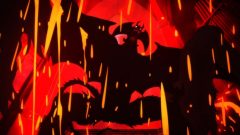It’s an exciting time to be an anime fan where new business models and players are making big waves within the animation industry. After debuting with the original and excellently-produced Neo Yokio, the juggernaut streaming service of Netflix has decided to revive the classic series of Devilman and gives it the full adaption treatment. By combining the sexual violence of its source material to the likes of Urotsukidoji and having big names like Masaaki Yuasa at its helm, the Devilman franchise makes a comeback into the western mindset after spending decades in obscurity.
For those of you not familiar with the Devilman series, it was a huge series in the 1970s where it tells the story of a teenage boy, bestowed with demonic powers, fighting against other unearthly horrors in an monster-of-the-week format. Subsequent OVAs attempted to follow the manga source more closely but could never finish the job. Devilman Crybaby makes a couple of liberal changes but the core story remains the same with Ryo and Akria teaming up to fight the demons with Miki supporting from the sidelines. Yuasa’s version adds a whole bunch of layers like the incorporation of track and field and roaming beatboxing freestylers . All those aspects are done quite well but perhaps the strongest aspect of having Netflix being the financier and distributor is being able to be very casual about its sexual and violent content. It was once said that:
There is nothing that arouses a stronger response in human beings than either sex or violence. A mixture of the two is very powerful indeed.
Unlike other anime where the mature content is done for the sake of being edgy, Devilman Crybaby uses its brutality to validates its darker themes as it progresses further along its story. I don’t want to give out spoilers but since the source is a 70s manga that influenced works like Berserk and Evangelion, there is nothing comforting about how everything plays out.
If you are familiar with Yuasa’s unorthodox animation style, then Devilman Crybaby’s eccentric visuals should come as no surprise. It doesn’t have that crude design of Ping Pong the Animation, but lacks the fancy special effects that other studios strive for. Instead, it swings between the plain and psychedelic color palette, the strength to this anime is not found in the details but the unhinged motions of its characters and artistics liberties taken with the framing/composition of its shots. Like its animation, the music (composed by Kensuke Ushio of Koe no Katachi and Ping Pong the Animation fame), is just as unique with its elements of synthwave and an epic orchestral choir to the point like it came out of Hotline Miami 2‘s soundtrack. In keeping up with the insanity shown on screen, the soundtrack does a very job and only serves to enhance the show overall.
Devilman Crybaby is the definitive complete package of its source material but it doesn’t come without its fair share of problems. Clocking in at ten episodes, I had an issue with its pacing especially towards the latter half of the series when Ryo’s grand plan comes into fruition and things get very crazy. It goes far too fast in its escalation of conflict between the demons and mankind and in a few instances, I had to pause and read between the scenes to understand the what exactly happened in the final episodes. In addition, Ryo and Akira’s memories of their early childhood together should have been sprinkled in far earlier in the series instead of shoehorning it into the last episode as it seemed rushed to have the foundation poured in before the conclusion of their conflict. The second negative is the amount of Erglish thrown around as it becomes a distracting element for the story’s more serious moments. While Roy’s japanese voice actor is relatively decent in pronouncing his English line when compared to other anime (I’m looking at you Zankyou no Terror), there are some major speeches where his delivery fall flat in invoking the intended reaction from the viewers.
Devilman Crybaby is not a show for everyone. It is a vulgar, uncensored and sexually violent reinterpretation dreamed up by the surreal creativity that is Masaaki Yuasa. For those of you who are able to stomach such things or have a fascination with anime’s more unhindered aspects, this show is the shining example of the medium is capable of and the new business direction it is heading towards. However, for all its praises, there are just a few significant issues that holds it back from becoming anime of the year although it would easily a top ten list for any serious anime fan. In any case, Devilman Crybaby was an experience for me that I won’t forgetting about anytime soon.
83/100







The pacing is an issue I had with Crybaby, and I wish they had made 15 episodes or just slowed the pacing down. Despite that, I still enjoyed the series. AKira was a great lead character, Miki was a wonderful supporting character, the animation was brilliant and the mature themes were handled pretty well. This is not the anime of the year, but it is one of the best titles of winter.
On a whim, I decided to give it a shot and blazed through all 10 episodes. I liked it overall, but that’s about it.
Felt like Yuasa disappeared after ep2 and it quickly devolved into a mess that did not hold together. I think besides the few droplets of maturity sprinkled here and there, this series has surprisingly little to offer.
My fav scene would be the baton scene in ep10 and the rapper guy confessing to Miko. The soundtrack was nice and I liked the depiction of sexual urges.
On the other hand the story was meh, themes inconsistent, pace horrible, characters devoid of all meaning and fanservice too shameless. And it wasnt as intelligent as it thought it was. There were several jarring, outward comedic scenes as well.
7/10 and I’m too kind because Yuasa and unadulterated boobies. A lot worse than Parasyte, which I would not claim amazing either.